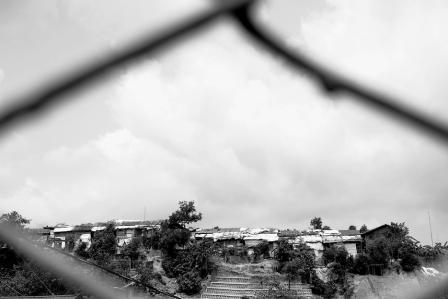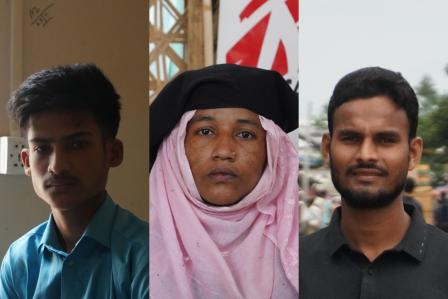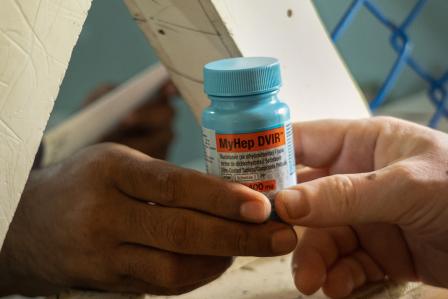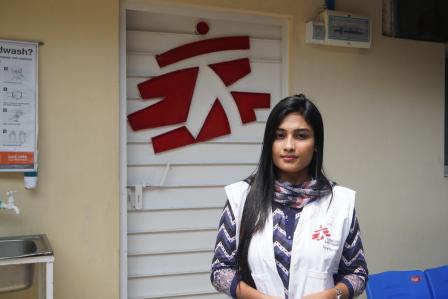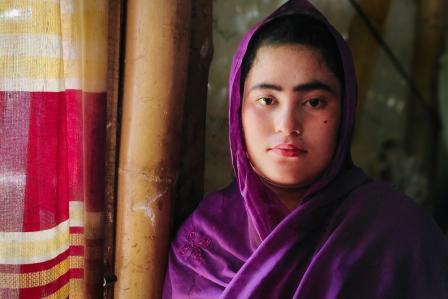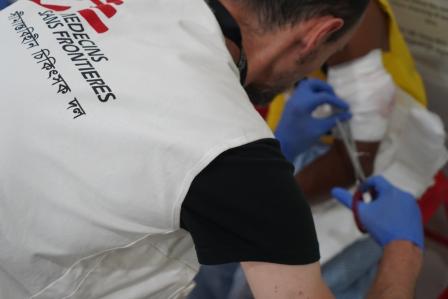Voices from the field: Alarming hepatitis C rates inside Rohingya refugee camps in Bangladesh
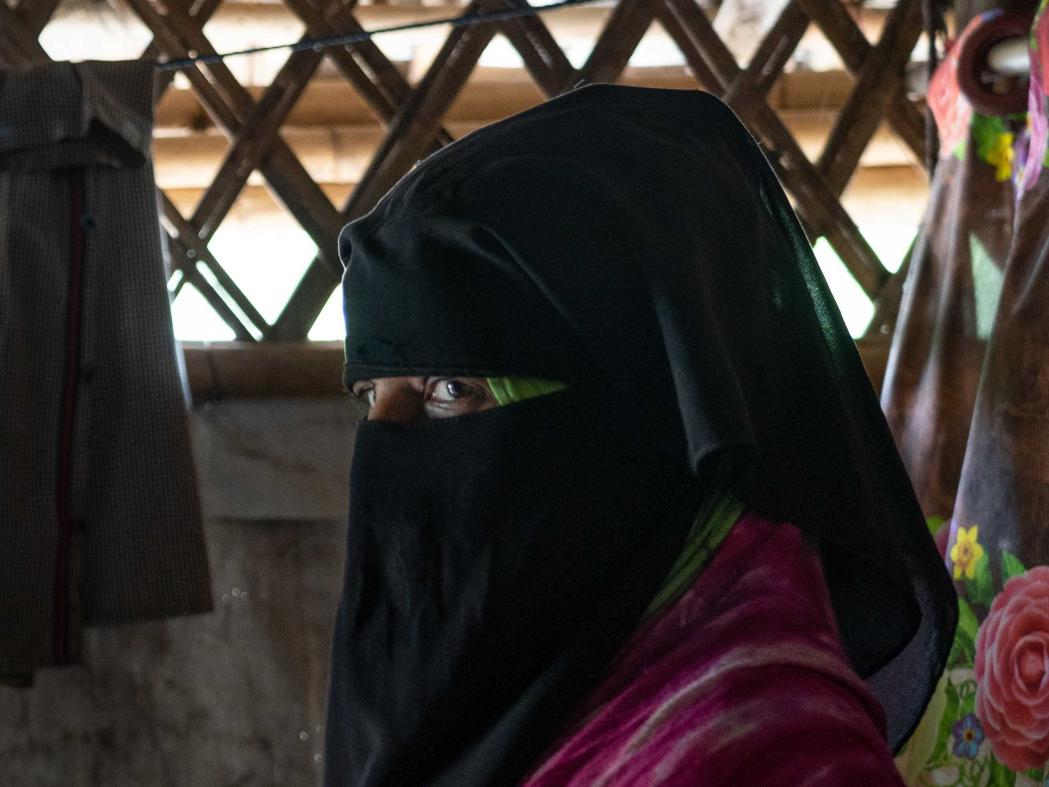
Ismat Ara is a Rohingya refugee living in Ukhiya, Cox’s Bazar Bangladesh at the Rohingya refugee camps. Ismat lost her husband due to Hepatitis C and now she is also diagnosed with it. Bangladesh, May 2024. © Abir Abdullah/MSF
However, a lack of capacity in the Cox’s Bazar camps means many Rohingya with hepatitis C miss out on treatment and being cured, leaving thousands at risk of severe liver disease. Our patients and staff on the ground gave their testimonies.
"If I had a cure, I could recover and take care of my children."
Ismat Ara is a 32-year-old mother of three living in the world's largest refugee camp in Cox's Bazar, Bangladesh. She is one of many Rohingya refugees struggling with hepatitis C (HCV) and limited access to treatment. Her story describes the daily realities faced by those living with this potentially life-threatening illness.
Ismat Ara's husband was the first in the family to fall ill. He died 4.5 years ago because of HCV, after a few days of treatment from Cox’s Bazar Sadar Hospital. "The hospital doctor said they had no medicine. There was no other way but seeking help from God. They had nothing else to do. We brought him home”. A few days later, “He was behaving like a madman and then he died."
Devastated and focused on caring for her children, Ismat Ara did not get tested for hepatitis C virus (HCV) at that time. It wasn't until years later, after experiencing her own symptoms, that she discovered she was infected by HCV.
"Abdominal pain, chest pain, difficulty breathing, constant weakness, and burning throughout my body," Ismat Ara describes her symptoms. These symptoms have a significant impact on her daily life. "I can't do housework, I struggle to fetch water, and even collecting rations feels overwhelming," she says.
Despite the challenges, Ismat Ara clings to hope. "If I had a cure, I could recover and take care of my children". She worries about their future, "What will happen to them if I die?"
In the camps, people have very limited HCV diagnostic and treatment options. Due to the high number of HCV patients since started a screening, diagnosis and treatment program in 2020, Doctors Without Borders had to limit and establish admission criteria mainly based on vulnerability and severity as our ability to absorb the care needs of people with hepatitis C had quickly reached capacity.
Ismat Ara repeatedly visits the Doctors Without Borders hospital, in the hope of getting treatment but was ultimately turned away due to age restrictions. "I came here around 200 times. They said I wasn't eligible for their treatment program because of my age." Ismat Ara clings to hope. "I saw a neighbor who got well after taking medications.” Witnessing others successfully treated with HCV medications fuels her desire for a healthcare system that can provide wider access to treatment.
Ismat Ara's story is not unique. There are countless Rohingya refugees struggling with HCV and limited access to treatment.
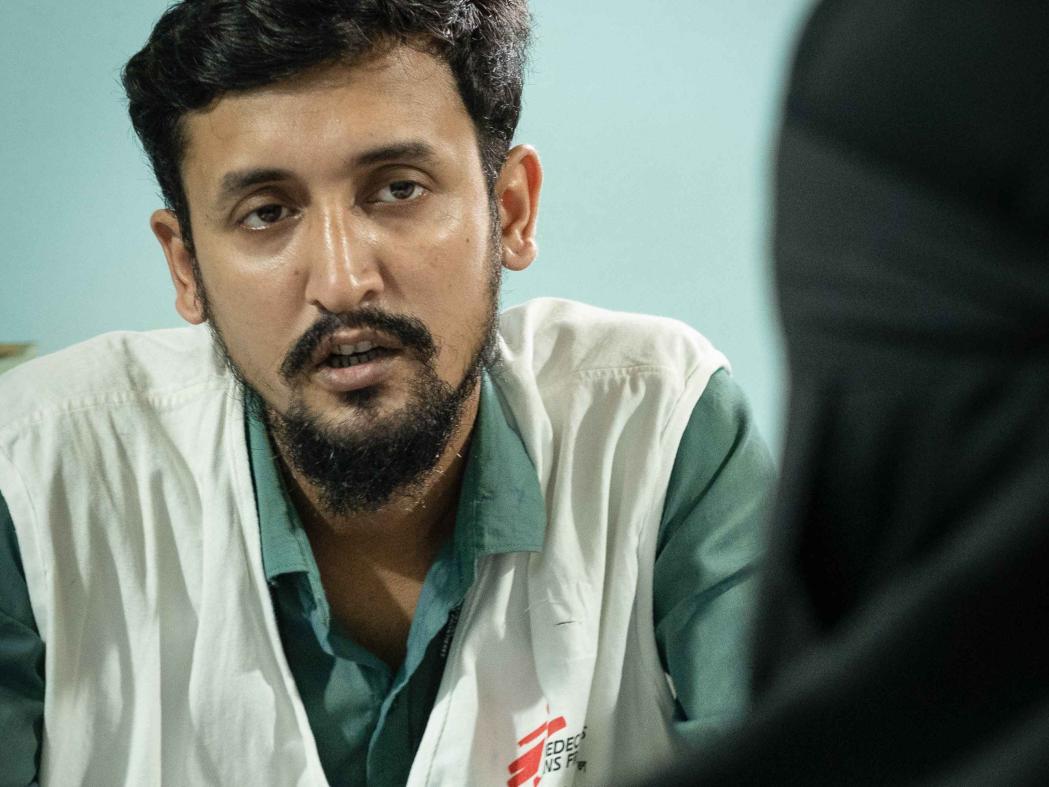
"Counseling different categories of people and ensuring they adhere to treatment can be challenging.”
HCV is curable but a lack of capacity in the Cox’s Bazar camps means many Rohingya with hepatitis C miss out on treatment and being cured. Tarequl Islam, Doctors Without Borders Mental Health Counselor, talks about the anxiety in the community caused. “When I started in 2017, there was a lot of fear around hepatitis C. Refugees had witnessed loved ones die from the disease”. This fear was compounded by the high cost of treatment outside the camps, forcing many to make impossible choices.
The mental health toll of HCV is profound. “Many patients who come to me initially have co-existing conditions like high blood pressure, diabetes, or HIV. Sometimes, they struggle to understand the importance of treating other health issues alongside hepatitis C,” says Tarequl. Fear, anxiety, and the weight of multiple illnesses converge, making mental health support an essential component of care.
Tarequl's role extends beyond medical care. “We assess their mental health and share this with the doctor.” The psychological toll of the refugee experience, coupled with the burden of HCV, creates a complex landscape for patients.
Tarequl Islam says: “We have a diverse range of patients – some live alone with many worries, some are elderly with memory problems, and others have psychosis. Counseling different categories of people and ensuring they adhere to treatment can be challenging.” His words underscore the complexity of the situation and the urgent need for sustained support.
Although Doctors Without Borders has made progress in increasing public awareness of HCV and mental health, there is still much work to be done. "Talking about mental health can be stigmatized in this community. However, Doctors Without Borders' health promotion team and camp-based volunteers have been working here for 6-7 years, conducting daily awareness sessions in the hospital and going door-to-door to talk about mental health."
The stories of Rohingya patients highlight the critical need for more funding and access to treatment. As Tarequl puts it, "without counselling, they would be even more afraid of HCV."
"Everywhere in my body was aching. Everything was unbearable."
Sura Khatun, a 55-year-old Rohingya refugee living in Camp 3, Cox's Bazar, Bangladesh, is one of countless individuals grappling with the silent epidemic of hepatitis C. Her journey highlights the immense challenges faced by refugees in accessing healthcare and the devastating impact of untreated illnesses.
"Everywhere in my body was aching. My hands and feet had swollen up. I was unable to perform any tasks. Everything was unbearable," Sura said, describing the harrowing ordeal she endured before her hepatitis C diagnosis. Her experience underscores the physical and emotional toll this disease takes on patients.
She came here in Bangladesh 15 years ago from Myanmar. Sura had never heard of hepatitis C. "I don't know how I got hepatitis C," she says. Lack of awareness around the disease often leads to delayed diagnoses and missed opportunities for timely treatment.
The road to recovery has been arduous for Sura. "I was trying to get better by taking medicines that were being sold on the side of the road," she shares, revealing the desperate measures people take when access to proper healthcare is limited.
While Sura has initiated treatment, the path ahead is uncertain. "Knowing that my husband's elder brother died due to this disease, thinking about it makes me feel very bad," she confides, expressing the fear and anxiety that accompanies a hepatitis C diagnosis.
Sura’s experience underscores the urgent need for expanded hepatitis C treatment programs in refugee camps. With limited resources and a population facing numerous health challenges, access to life-saving medications remains a critical barrier. Doctors Without Borders' work in Cox’s Bazar is a testament to the dedication of healthcare providers working tirelessly to address the unmet needs of this vulnerable community.
Sura’s story is a powerful reminder that behind every statistic lies a real person with hopes, fears, and dreams. It is a call to action to prioritize the health and well-being of Rohingya refugees, and to invest in comprehensive healthcare solutions that can break the cycle of suffering and disease.
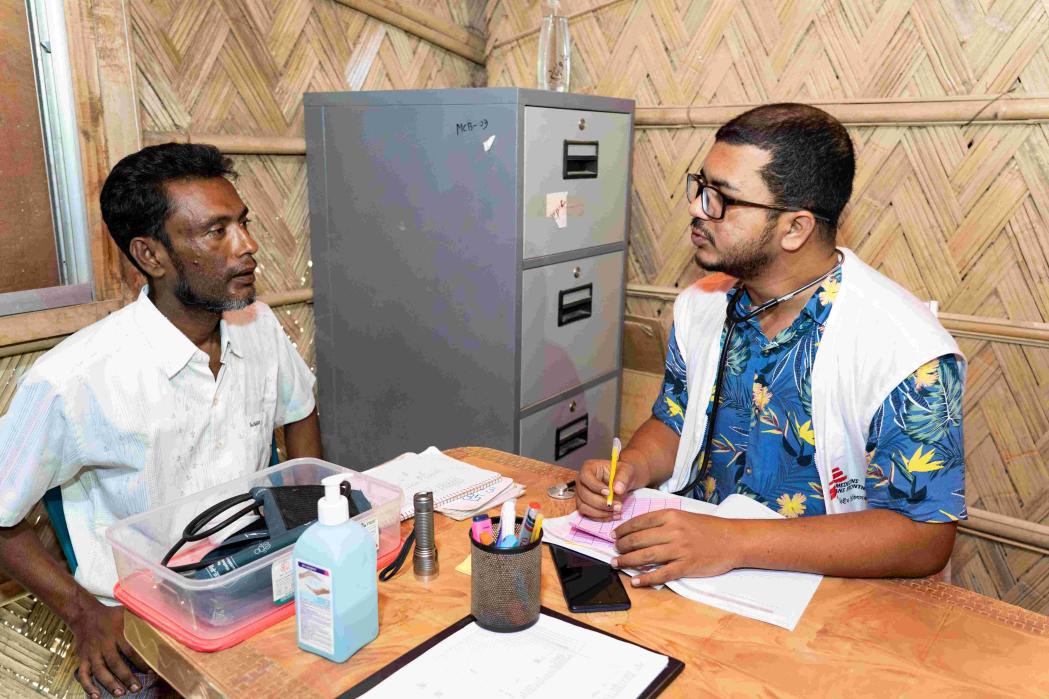
"We have seen that at least 50% of the people don’t know what hepatitis C is."
dr. SM Tareq Rahman, Medical Activity Manager for Doctors Without Borders' Hospital on the Hill, describes the situation: "Almost one-third of the population has been infected with HCV at some point, and 20% have an active infection". This translates to an estimated 85,000 people in urgent need of treatment.
Doctors Without Borders has been providing HCV care in Rohingya refugee camps since 2020, offering free screening, diagnosis, and treatment. "We've treated around 8,000 patients so far," Dr. Rahman shares, "but the needs are immense." Yet obstacles are very real. "Limited resources compared to the level of needs force us to prioritize most severe and vulnerable patients," he explains.
The lack of awareness about HCV prevention and transmission is another hurdle. "Apart from the clinical findings, we have seen that at least 50% of the people don’t know what hepatitis C is. Also 65% of the population doesn't know how they can prevent the infection."
Despite these constraints, Doctors Without Borders is determined to make a difference. "We're advocating for increased support from the international community to expand screening and treatment access," says Dr. Rahman. "The situation is dire, and we need to act now to prevent a catastrophic health crisis."
With the current increase in hepatitis C cases in the camps, a coordinated humanitarian effort in the camp to implement a large-scale test and treat campaign is urgently needed. While Doctors Without Borders has been the largest provider of hepatitis C care for four years in Cox’s Bazar’s Rohingya refugee camp, our capacity cannot keep up with the needs of the populations.


